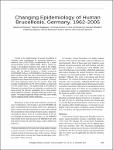Changing epidemiology of human brucellosis, Germany, 1962-2005.
Dahouk, Sascha Al
Neubauer, Heinrich
Hensel, Andreas
Schöneberg, Irene
Nöckler, Karsten
Alpers, Katharina
Merzenich, Hiltrud
Stark, Klaus
Jansen, Andreas
Trends in the epidemiology of human brucellosis in Germany were investigated by analyzing national surveillance data (1962-2005) complemented by a questionnaire-based survey (1995-2000). After a steady decrease in brucellosis incidence from 1962 to the 1980s, a persistent number of cases has been reported in recent years, with the highest incidence in Turkish immigrants (0.3/100,000 Turks vs. 0.01/100,000 in the German population; incidence rate ratio 29). Among cases with reported exposure risks, 59% were related to the consumption of unpasteurized cheese from brucellosis-endemic countries. The mean diagnostic delay was 2.5 months. Case fatality rates increased from 0.4% (1978-1981) to a maximum of 6.5% (1998-2001). The epidemiology of brucellosis in Germany has evolved from an endemic occupational disease among the German population into a travel-associated foodborne zoonosis, primarily affecting Turkish immigrants. Prolonged diagnostic delays and high case fatality call for targeted public health measures.
No license information

